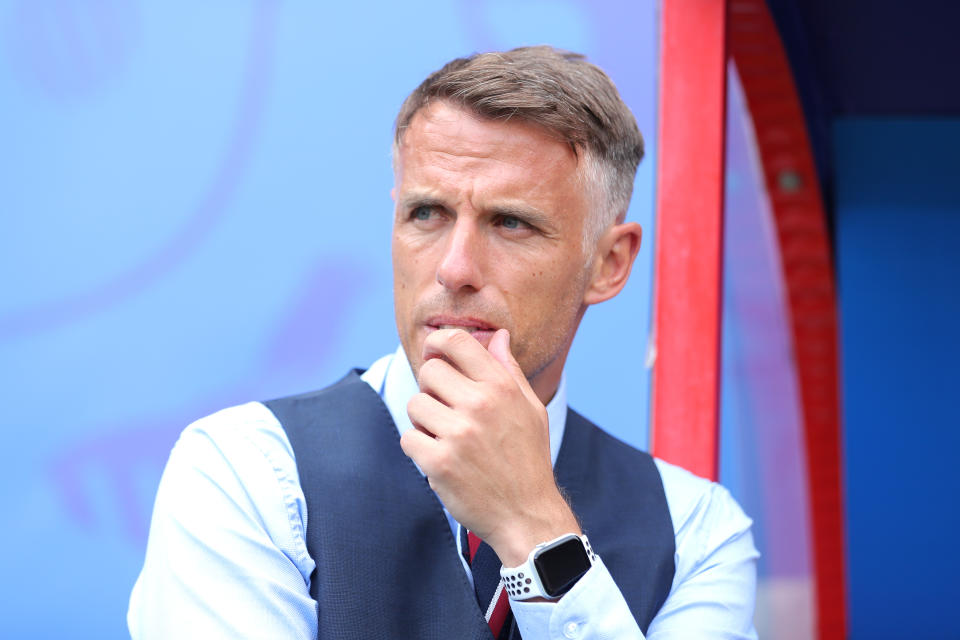Behavior policing is a luxury afforded much more to Phil Neville than to Cameroon
The images were going out worldwide, all right.
Both of Cameroon’s questionable behavior – and Phil Neville’s response to it.
The England manager delivered a searing post-match interview with BBC Sport, prompted by nothing outside of routine media obligation, during which he criticized Cameroon’s remonstrations after multiple refereeing decisions during Sunday’s Women’s World Cup encounter.
The sharpest comments came toward the end of his nearly minute-long answer.
“There are young girls that are playing all over the world that are seeing that behavior,” Neville said. “For me, it’s not right, and I can’t stand here and say that, ‘It’s fantastic, it’s brilliant, we’re into the last 16.’ There’s a bigger picture. It’s a quarterfinal, so there’s a bigger picture here. There’s a certain standard of behavior that we’ve got to do.”
There is. There’s also a standard of discussion this whole situation requires.
It’s tough to defend Cameroon strictly on their actions. Striker Ajara Nchout and manager Alain Djeumfa were particularly direct with the fourth official following a controversial offside call that denied them a goal. Veteran forward Madeleine Ngono Mani stood up and yelled from the bench. The referee had to break up an impromptu huddle that was delaying kickoff following the first England goal. Alexandra Takounda could well have been red carded for her challenge on Steph Houghton. That it came in the 10th (!) minute of stoppage time tells you how much interruption took place overall.
So no, Cameroon’s behavior wasn’t sporting. But it’s worth attempting to understand the context of this. All of it. From Cameroon to Neville himself.

The FIFA Women’s World Cup doesn’t introduce discrepancies, it exposes them. We saw that writ large when the United States blew threw Thailand 13-0 in a game between two teams purportedly on the same level of professionalism.
But they weren’t. FIFA’s mission statement includes the phrases “promote the game” and “bring the game to all.” Glistening words, with little conviction behind them.
The Guardian describes Cameroon’s top flight, where over a third of the team plays, as an “underfunded domestic championship staged in appalling conditions.” Even the eight players who ply their trade in France’s Division 1 Féminine, one of the top leagues in the world, make just shy of $48,000 a year.
Moreover, Fecafoot, Cameroon’s governing body for soccer, provided a budget of $2.5 million to the women’s team this year. Or about $20 million less than England’s. Even then, England received a paltry 14 percent of the Football Association’s overall budget – and that’s the most any European nation spent on its women’s team this year.
This, however, isn’t all that revelatory. FIFA does not spend on the women’s game. This isn’t news.
Shouldn’t it be considered, though, in this instance? Money doesn’t just help you treat and train players better. It courses through the entire infrastructure of your program. Charles Olney, a contributor to Stars and Stripes FC and Backline Soccer, made an astute point about VAR’s implementation at this Women’s World Cup, which also stands true here: In too many places around the world, there’s simply no expectation of quality officiating.
Apply that to Sunday how you will. Nchout told the media after the game the team had been unhappy with officiating for much of the tournament. Is Cameroon upset the games are being called so tight? Are they disappointed that now, finally, when they have quality officiating, the calls were wrong, at least in their eyes?
Whatever it was, their root emotions shouldn’t be denounced, even if their actions should. That didn’t stop Neville, who continued to rant in his media conference.

“I was proud of our performances, under circumstances I’ve never seen before. And I am completely and utterly ashamed of the opposition,” he said, per the Manchester Evening News. “I didn’t enjoy the game. My players didn’t enjoy the game, apart from getting to the quarterfinals.
“All the young boys and girls watching, and we’ve had five, six and seven million people watching back at home against Cameroon with that kind of behavior. That’s pretty sad. I’ve got to tell the truth to everyone. It takes you back to times when you went home crying with your ball.”
In fairness, Neville was agitated in the moment. The horror challenge against Houghton was fresh in his mind. And while a brisk reading suggests Neville is making the conversation about himself, one could easily argue it’s better for a manager to funnel outcry toward himself and away from the players.
Still, closer scrutiny does his comments little favor. What “home” is he talking about, exactly? The modern nation with a top-10 GDP where the average life expectancy is eight decades? Or the nation with destitute healthcare, the population in the bottom quarter of literacy rate and a human development index a fraction above “low”?
The Cameroonians were playing from behind long before Neville’s side ever scored a goal, or before any call went against them. “Deal with it,” he told them after the match. If only it were that simple on a broader scale.
Again, though, this is about guiding conversation, not silencing it. Cameroon will likely be punished in some form or fashion. Neville’s entitled to his outburst, and his honesty is welcome. It can lead to productive discussions.
It cannot, however, be allowed to lead to sweeping castigations of women’s soccer. As author Tariq Panja pointed out, why make this gender-specific when petulant players tarnish men’s soccer too?
Furthermore, why is it so easy for people to rally behind a multimillionaire who hasn’t had to worry about money since his early teens, one who had zero prior managerial experience before taking the England women’s job, and not a group of underprivileged women watching their dreams slipping away before their very eyes? Aren’t they all occupying the same emotionally charged moments? Is personal conduct in world soccer really something to selectively criticize?
Seems it is for Neville and others. Difference is, that’s the biggest thing they have to worry about.
More from Yahoo Sports:

